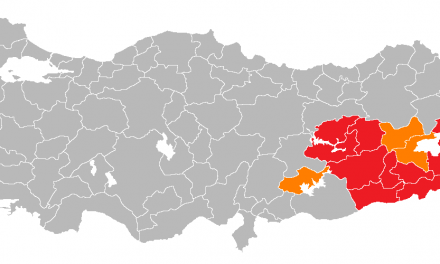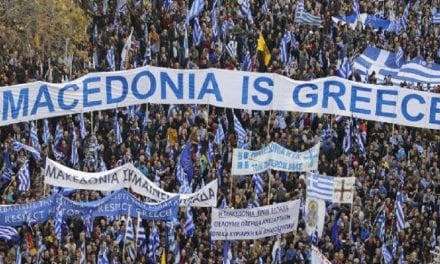By Al-Monitor
On Sept. 28, Turkish newspapers reported that a Greek school was reopened after four decades on the Aegean island of Gokceada, known as Imbros in Greek. In reality, however, the school was reopened after 51 years. Moreover, the closure of Gokceada’s Greek schools in 1964 was not because they ran out of students, as the reports said, but because the Turkish state had shut them down.
Half a century ago, the schools had about 450 students. Today, the number is 14 — three students in primary, five in secondary and six in high school. Barring those in primary school, only one student was born on the island. The others are the children of Greek families, natives of the island who had immigrated to Greece and are now drawn back by the revival of schools.
Greek-language education on Gokceada resumed after a 49-year hiatus in 2013 when a primary school was reopened. The secondary and high school sections were expected to follow suit last year, but delays in renovation work deferred their inauguration to 2015.
For Turkey’s dwindling Greek minority, the reopened school represents both a reminder of a painful past and a hope for the future. As Laki Vingas, a community leader personally involved in the efforts, told Al-Monitor, “For a community whose history abounds with suffering, scars, lost values, closed schools, banishments and confiscated lands, this school lays the foundation of a [new] vision and dream for the future.”
For Vingas, who heads the Imbros Education and Culture Association, the low number of students today is not important. It’s the future that matters.
Gokceada, along with the nearby island of Bozcaada (Tenedos), became Turkish territory under the 1923 Lausanne Treaty, modern Turkey’s basic founding document. It’s the country’s largest island and westernmost territory, situated strategically at the southern entrance of the Dardanelles Strait. The island was known as Imbros — a variation of its Greek name — until 1970, when it was renamed with a government decree. Under Article 14 of the Lausanne Treaty, Imbros and Tenedos — their populations almost exclusively Greek — were supposed to have an autonomous administration, including a police force recruited from the local population. The provision was never implemented.
The Greek islanders had to wait more than nine decades before one of their own was recruited to the municipal police last year. But even this small gesture is a source of optimism. “He may not be a general, but still, seeing a community member in uniform made us happy. It was the first time we were accorded a uniform, the first time trust was established,” Vingas said. “In today’s world of open democracies, this may sound comical and anecdotal. Yet a Greek man serving as a municipal police officer means that the normalization process has started.”
Under the Lausanne Treaty, the Greek residents of Imbros and Tenedos were exempt from the post-war population exchange between Turkey and Greece. The islanders did stay, but Imbros’ Greek population numbers only 318 today, down from 6,555 in the 1927 census. In contrast, the number of Turks has grown from 157 in 1927 to about 8,300, according to census figures from last year.
Like the self-rule clause, other key provisions of the Lausanne Treaty were overrun. In 1927, a special law on the administration of the two islands removed the Greek population’s right to education in their mother tongue. The legislation enforced Turkish as the language of schooling, stipulating that Greek could be taught as a paid language course outside school hours upon the request of parents. The ban continued for 24 years until 1951 when a thaw in relations with Greece led to the suspension of related provisions.
In 1964, however, the ban was back in force as bilateral ties soured over the Cyprus problem. Islander children hit the roads again — either to Istanbul, where Greek schools remained open, or to Greece. In the words of Stelyo Berber, a community activist, Imbros existed as a “childless island” for half a century as “people were forced to leave their homeland to give their children schooling in their mother tongue.”
Erol Saygi, a Turkish teacher who got his first job on Imbros in 1964, would later write how the islanders valued education and how attached they were to their homeland. “Everyone on the island, shepherds included, had higher education. They would graduate from universities in Athens and return home to be with their families, continuing to work in traditional jobs. They did farming and husbandry,” Saygi wrote in a book published in 1986.
The problem of schooling, however, was not the only reason why the Greek share in the island’s population fell from 97% in 1927 to 3% today. The draconian wealth tax during World War II and the Sept. 6-7, 1955, pogroms in Istanbul and Izmir forced many non-Muslims to emigrate. Yet some 5,500 Greeks still lived on Imbros in the 1960s.
A series of blows thereafter fueled the exodus. In 1965, the government expropriated the most fertile of the island’s limited farmlands in return for compensations, which writer Sotiris Theoharis describes as “the price of a few eggs.” A semi-open prison was built on the expropriated land. The islanders lived in constant fear, as convicts of serious crimes, including murder, robbery and rape, were able to freely roam the island. Some are said to have committed the same or similar offences before the prison was closed down in 1992.
More land expropriations followed to build a special-production farm and open room for military zones. Restrictions were placed on other mainstays such as husbandry and fishing, while military security measures curbed the free movement of residents. Meanwhile, more and more Muslim families from Anatolia were resettled on the island, a process that had started decades ago. Villages were given new, Turkish names, and new settlements sprang up as Greek islanders faced legal obstacles in acquiring property.
In 1970, for the first time in its history, the island’s Greek population was no longer the majority. It was down to 2,576 people as opposed to 4,020 Turks. The Greek-Turkish conflict in Cyprus, which culminated in Turkey’s 1974 invasion, and other bilateral tensions kept fueling the exodus. By 1985, the Greeks dwindled to 472 people, and by 1990, to 300. Today, their number is slightly up at 318 following the return of several families from crisis-hit Greece, encouraged by the reopening of schools.
According to Vingas, Turkey’s total Greek population numbers between 4,000 and 5,000 by the boldest estimates. Others say it is less than 2,000. A century ago, in 1919, the number stood at 1,015,000, according to a 2008 paper, “The politics of population in a nation-building process: Emigration of non-Muslims from Turkey,” by Turkish scholar Ahmet Icduygu and co-authors. The Turkish War of Independence that followed the collapse of the Ottoman Empire in World War I sparked mass migration waves, coupled with a population exchange. As a result, the first post-war census in 1927 put Turkey’s total Greek population at 110,000. By 1990, the community numbered 8,000, according to its leaders. Today, fears are rife that it stands on the brink of extinction.
Nikolaos Uzunoglu, head of the Athens-based Universal Federation of Istanbul Greeks, believes that, unless measures are taken, the minority will dwindle to less than 500 in a decade and die out altogether. He pins his hope on the return of young people, the children of native Istanbul Greeks, 98% of which now live in the diaspora, and calls on Ankara to lend support.
Three Greek schools with about 230 students remain open in Istanbul today, according to Vingas. The reopening of the secondary and high school in Imbros comes as a fresh hope for many, like Kosta Hristoforidis, the head of the Athens-based Imbros Association. The 15,000-strong Imbros diaspora, based mostly in Greece, maintains close bonds with the island, he says, adding, “It is our home.”


















